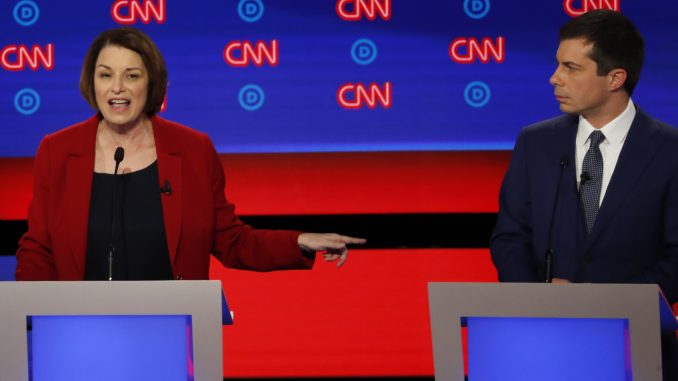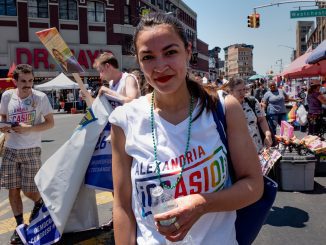
CHICAGO — The 2020 Democratic presidential primary campaign drew a record six female candidates to the field. But with just less than three months until voting starts, only one has risen to the top tier.
Is it sexism or just politics?
That’s the debate that erupted Monday as one of those candidates, Sen. Amy Klobuchar, publicly complained about gender bias in the race, saying voters and the media were giving rival Pete Buttigieg, a small-town mayor, more support and attention because he’s a man. A woman with a similar resume, Klobuchar argued, wouldn’t be taken seriously enough to make the debate stage.
The comment seemed to touch a nerve in an election where gender politics is never far from the surface. Many in the party believe Hillary Clinton was a victim of sexism and voters who hold women to a different standard when she lost to Donald Trump in 2016. They’re still hungry to elect the first female president and vigilantly working to combat signs of bias.
Still, Klobuchar’s comment was striking as it seemed aimed at a candidate also attempting to make history by becoming the first openly gay president.
The three-term senator from Minnesota said Sunday on CNN’s “State of the Union” that she believes Buttigieg, the 37-year-old mayor of South Bend, Indiana, is qualified but that she’s the better candidate.
“I’m the one from the Midwest that has actually won in a statewide race over and over again,” Klobuchar, 59, said, adding that she can bring in voters like those in Kentucky and Virginia who supported Democrats in last week’s election. “Those are the kind of voters I have won. And that’s not true of Mayor Pete. That’s just a fact.”
Buttigieg has been one of the surprises of the Democratic presidential primary, rising from an unknown to a top candidate who has raised more money than almost all his rivals.
He is a Harvard graduate, Rhodes scholar and military veteran who is gay and married to his husband. He’s won over voters who say that he’s intelligent and that they appreciate his calm demeanor, his oratory skills and his message of generational change.
“I think, obviously, sexism is a force in politics. I also believe that I’ve gotten to where we’ve gotten to by having the right message, the right organization, reaching out to voters and convincing more and more of them to join this vision,” Buttigieg said Monday. “And if I can continue to do that, then we’ll win, and if I can’t, well, that’s what we’ve got to do.”
Kimberly Peeler-Allen, a visiting practitioner at the Center for American Women and Politics at Rutgers University and co-founder of Higher Heights, which supports black women in politics, said Klobuchar’s comments were about more than Buttigieg.
She said there’s an expectation of what people in leadership, particularly the presidency, should look like in this country, and pointed to female mayors of cities that are similarly sized to South Bend who likely wouldn’t be taken seriously as presidential candidates. That’s particularly true for black women, she said.
“It is more of a callout of the electorate and the powerbrokers and media and how they’re covering people than on Mayor Pete himself,” Peeler-Allen said.
Buttigieg’s own sex could wind up hurting him if a man wins the nomination, she added, because a male Democratic nominee will almost certainly choose a woman, likely a woman of color, as a running mate.
African Americans and women make up the backbone of the Democratic Party, and a candidate can’t win without a strong performance in both groups. There’s a strong sense among party members that the Democratic ticket must include a representative of one or both groups.
Buttigieg also has faced bias over his sexual orientation, which some people see as a barrier to his being elected, particularly among African American voters, and he has encountered anti-gay protesters at stops on the campaign trail.
Klobuchar has never lost a campaign, dating back to her bid to be the top prosecutor of Minnesota’s largest county and her first Senate race in 2006, when she became the first woman elected to the U.S. Senate from Minnesota. She won her third term last year with 60% of the vote in Minnesota, which went for Clinton in 2016 but which Trump hopes to make a play for in 2020.
Buttigieg has run for statewide office once, in 2010, when he was the Democratic nominee for treasurer in the red state of Indiana. He lost to the Republican by more than 400,000 votes, winning about 38%.
He easily won his second term as mayor of South Bend, a community of about 100,000 people, with just over 8,500 ballots cast for him.
Buttigieg said performance in previous elections may not be the best test of a candidate’s electability. Trump had never held public office before he won in 2016.
“If the measure of whether somebody can become president is how many votes they’ve gotten in previous elections, we wouldn’t be here,” Buttigieg said during a bus tour through New Hampshire.



